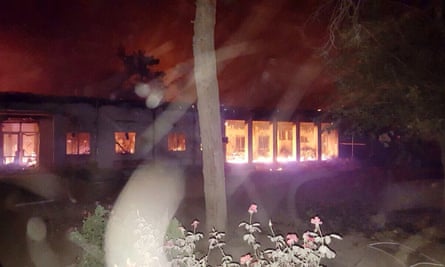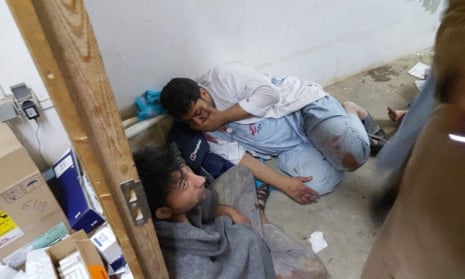A US airstrike that killed up to 20 aid workers and patients in a Médecins Sans Frontières (MSF) hospital in Afghanistan constitutes a “grave violation of international law”, the charity’s president has said.
The bombardment, which occurred early on Saturday morning, went on for more than 30 minutes despite the charity raising the alarm with US and Afghan officials, and destroyed much of the compound in Kunduz.
The hospital had treated hundreds of people injured after the northern city fell to a dramatic Taliban attack last week, and when government troops launched an assault to reclaim it. Beds and corridors were still crammed with patients and their relatives when it was hit in the early hours of Saturday morning.
On Saturday evening, the dead included at least 12 members of staff and seven patients – three of whom where children. An MSF source told the Guardian the death toll could rise further.

“This attack is abhorrent and a grave violation of international humanitarian law,” said Meinie Nicolai, MSF’s president. “We demand total transparency from coalition forces. We cannot accept that this horrific loss of life will simply be dismissed as ‘collateral damage’.”
Jonathan Whittall, the charity’s head of humanitarian analysis, added: “MSF demands clarity on exactly what took place at our hospital in Kunduz and how this unacceptable event could have happened.”
The US military has been providing bombing raids to support Afghan forces fighting to reclaim control of Kunduz from the Taliban. It admitted that an airstrike may have caused “collateral damage”, a military term for civilian deaths and injuries.
“US forces conducted an airstrike in Kunduz city at 2:15am [local time] on 3 October against individuals threatening the force. The strike may have resulted in collateral damage to a nearby medical facility. This incident is under investigation,” said Col Brian Tribus, spokesman for international forces in Afghanistan.
The clinic should have been clearly marked on military maps, and the attack revived long-standing questions about whether Afghan forces and their Nato allies do enough to protect civilians.
“Why did the US blow up the whole hospital?” said Nasratullah, whose 25-year old cousin Akbar was among the doctors killed. “We know that the Americans are very clever. If they can target a single person in a car from their planes, why did they have to blow up the whole building?”
The charity said it had recently recirculated GPS coordinates of the hospital to all parties fighting in the conflict, even though it has been operating for years and is one of few medical facilities in the city so should have been well known.
Human Rights Watch said it had serious concerns about whether US forces had taken sufficient precautions to avoid striking such a sensitive target. Hospitals are among areas protected from attack under international laws governing conflict.
“The bombing of the hospital is a shocking development for Kunduz, where civilians and aid workers are already at grave risk from the fighting,” said Patricia Gossman, a senior researcher at the group. “All forces are obligated to do their utmost to avoid causing civilian harm.”
She called for an impartial investigation to establish the circumstances of the attack, and urged the US to review its targeting procedures to ensure such incidents do not reoccur.
Sarwar Husaini, a spokesman for Kunduz police, claimed Taliban fighters had entered the hospital compound on Friday evening and were firing at security forces from inside. MSF say they can’t confirm the claim. “We have absolutely no information about that,” the charity said.
Surviving staff tried to help the injured, and MSF posted pictures of an operation in an improvised surgery, but other pictures showed staff members apparently collapsed in shock and grief.
The main building of the hospital was completely gutted by the blaze, with some bodies of those trapped inside charred beyond recognition, said Qiamudeen, a 31-year-old whose neighbour was killed in the strike. “I was shocked, emotional and in tears when I reached the hospital,” he told the AFP news agency.
At the time of the bombing, 105 patients and their carers, and more than 80 MSF international and national staff were in the hospital. At least 37 staff members were wounded in the incident, it said. None of the international doctors volunteering at the facility were hurt.
An MSF staff member, who was on duty at the time, told the Guardian: “I was inside my office. Around 2am, the plane started bombing the main building of MSF. It lasted one and a half hours. After 3.30am, I came out from my office and saw all of the hospital was on fire.”
The injured and any surviving patients had to be evacuated to a town two hours drive away, because the damaged hospital could no longer operate.
